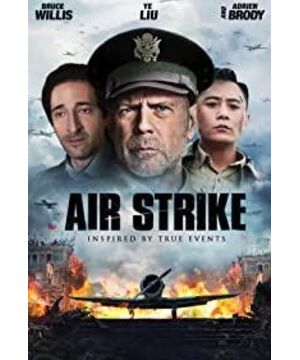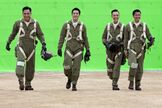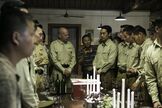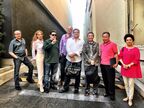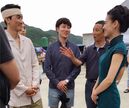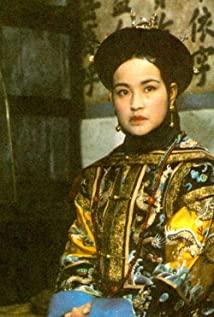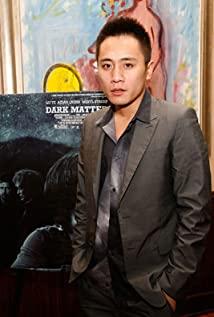baba changes, history, history that changes.
Big bombing is really big fraud
Once the film is shot, it has its own independent meaning, and it no longer belongs to the creator himself. A reasonable attitude is to decide how to deal with it according to the content and value orientation of the film.
"The Great Bombing" is indeed a bad movie. It used the so-called "heroic and optimistic" to cover up the corruption and incompetence of the Kuomintang, and used the blood of the soldiers and civilians who died in Chongqing during the bombing to wash away the faces of Chiang Kai-shek, Soong Mei-ling and the corrupt officials of the Kuomintang, big and small. The dirt on China distorts the history of the Chinese People's War of Resistance Against Japanese Aggression.
The "Official Announcement" of "Big Bombing" said that the film shows that "Chongqing citizens are still alive, optimistic and strong in the face of the brutal and indiscriminate bombing by the Japanese army, showing the national integrity of Chongqing's immortality and China's immortality. In order to protect the Homeland, young Chinese pilots fought a series of tragic and tragic aerial battles with the Japanese Air Force with the help of American flight instructors."
The advertisement of "Big Bombing", no matter which one, will type four big characters: The more bombed, the stronger!
In the trailer, the national army pilots played by Liu Ye and Nicholas Tse were all smiles when they got off the plane, as if they had just won a battle, or even just bombed Tokyo.
The twin brother pilot played by Song Seung-heon also fell in love with a female battlefield reporter.
Soldiers like this, citizens feel good too.
The teahouse was still bustling, and the mahjong hall was also crowded. There was even a mahjong contest held in the dugout.
The mahjong parlor played by Fan Wei is carrying a bird in a cage as usual, and is rude everywhere...
Through such scenes and plots, "The Great Bombing" succeeded in creating the impression that Chongqing was an optimistic, heroic, and united wartime capital that ultimately thwarted the Japanese bombing.
Is that so?
The real situation in Chongqing during the war was far from the situation shown in "The Great Bombing", or even diametrically opposed.
From February 18, 1938 to August 23, 1943, the Japanese army carried out a strategic bombing of Chongqing for more than five years. According to incomplete statistics, in the past five years, Japan bombed Chongqing 218 times, dispatched more than 9,000 sorties, and dropped more than 11,500 bombs.
More than 10,000 people were killed in the Chongqing bombing, more than 17,600 houses were destroyed, and most of the downtown areas were destroyed.
In addition to directly killing and injuring citizens, the bombing of Japanese planes made Chongqing a "famous" city due to the environmental pollution caused by the long-term bombing. Encephalitis and smallpox are quite popular, causing a large number of people to die indirectly.
Due to the corruption of the Kuomintang and the foolishness of Song Meiling, the "mother of the Air Force", after the Japanese bombing began, the Kuomintang had no air force worth mentioning to defend Chongqing. The mercenary "Flying Tigers" played some very limited roles.
Therefore, the Japanese bombing of Chongqing was unscrupulous, except for the weather factor, many times it was not hindered at all.
Zhu Shaochen, a Chongqing citizen who had experienced the bombing, recalled the scene in the Chongqing air-raid shelter when the Japanese planes bombed for a long time——
The emergency alarm sounded again, and the air in the cave became tense. The people who had already squeezed out of the air-raid shelter tried their best to dig in, and the people inside pushed hard to the outside. You pushed me. At this time, someone shouted in horror, "Stamped to death! Stamped to death!" The crowd became even more turbulent.
The little Japanese planes were still bombing outside, and the sound of violent explosions seemed to be at the entrance of the cave, and the bomb shelter was shaking. Gradually, some people fainted, some had the idea of committing suicide, kept hitting their heads against the wall, and some even cut their wrists and throats with knives; young people with good physical strength supported the shoulders of those around them, trying to get out of the crowd. They crawled out from the top of their heads, but they didn't climb for a long time before they were firmly grabbed by the hands or feet and pinned there...
This kind of tragic situation was replaced by Fan Wei's hippie smile and the shuffling sound of "Crash" in the movie "The Big Bombing".
In the face of the barbaric bombing by the Japanese planes, Chiang Kai-shek and the Kuomintang not only failed to hold up a protective umbrella for Chongqing from the air, but also the ground air defense, ambulance, firefighting and other work were in a mess, greatly aggravating the suffering of the citizens of Chongqing.
To name a few:
——In order to strengthen the air defense of Chongqing, the National Government established the Air Defense Command and appointed Liu Zhi as the commander-in-chief of the Chongqing garrison and air defense commander.
Liu Zhi immediately asked the Military Commission to set up a special air defense unit under the jurisdiction of the communication team, the protection team, the stretcher battalion, the engineering team, the treadmill platoon, the alarm station, the air liaison post, the intelligence transmission post and other departments, which are directly under the Air Defense Command.
However, Liu Zhi did not recruit new soldiers for the formation of the air defense force, but replaced them with the original garrison troops of the garrison headquarters, and then used a forged roster to defraud the army. Most of the funds issued by the Nationalist government to the air defense force fell into Liu Zhi's personal pocket.
Chongqing's air defense is undertaken by a "shadow force" that is not real, and its effect can be imagined.
——From May 3rd to 4th, 1939, the Japanese bombing caused a fire, which burned down nine-tenths of the houses in the urban area of Chongqing and caused countless casualties. It was an unprecedented massacre in Chongqing.
At that time, the National Army stationed in the suburbs of Chongqing had 6 divisions and many independent regiments. After the fire broke out, Liu Zhi, the commander-in-chief of the garrison, ordered all the troops to immediately dispatch firefighting equipment, but none of them responded. Instead, they asked Liu Zhi for fire-fighting equipment. Since the funds had already been embezzled, there was no equipment to distribute, and the garrison commander-in-chief was at a loss. . It was not until the afternoon of the next day, under the criticism of public opinion, that Liu Zhi ordered to pay one yuan for a haul of water, and then tens of thousands of troops were mobilized to participate in the firefighting. Originally, there were only more than 20 fires in the beginning, but at this time, the whole city was on fire, and the loss of the general public was extremely heavy.
After the national army began to fight the fire, they took advantage of the opportunity to loot. After the fire, a large number of citizens were evacuated to the countryside. Many unburned things were scavenged by the National Army troops who stayed in the city. The remaining wood was stored as firewood for burning, and the damaged houses were slightly repaired for their own use. Even asking the homeowner for a high price redemption. After the fire, many firefighting teams competed to see who made the most money in the fire.
——The famous Chongqing Tunnel Massacre occurred on the night of June 5, 1941.
At that time, the issuance and lifting of the Chongqing air defense alert had to be carried out only by the order of the deputy air defense commander, Hu Bohan. Because Hu Bohan was stubborn, he refused to lift the alarm when the enemy plane was not in the air, and let the masses go out to change the air. As a result, 992 people died of suffocation and 151 people were seriously injured.
After the tragedy, the Air Defense Command dispatched a stretcher battalion to rush to transport the wounded. Unexpectedly, when these people entered the air-raid shelter, they first started to search for the property of the dead body, which greatly delayed the time. At that time, many people were still in a state of suspended animation. If they were lifted out of the hole in time for ventilation or artificial respiration, some people could be saved. And some people were not completely unconscious, and they were still struggling when they were being searched for their belongings. The stretcher soldiers strangled these people to death.
At that time, Jiang Yinbing, the traffic director of the garrison headquarters, and Liu Jilong, the traffic director, were in charge of the removal of the body. When they found out that this was an opportunity to make a fortune, they immediately ordered to search the pockets of the stretcher soldiers. Some of the stretchers resisted, and Jiang Yinbing ordered a resisting stretcher to be shot at the entrance of the cave as a demonstration. The found property (gold and silver jewelry, watches, banknotes, etc.) was delivered to Liu Zhi's house three times by car.
It should be emphasized that Liu Zhi was Chiang Kai-shek's most trusted national army general, and until the last moment, let him serve as the commander-in-chief of Xuzhou's "commander-in-chief". Liu Zhi's corruption and greed are inseparable from Chiang Kai-shek's protection and connivance.
……
All the ugliness of the Kuomintang was not shown in "The Great Bombing". Instead, Chongqing under Chiang Kai-shek's rule was shown as "unity, heroism, and optimism" in the film. Isn't this a blatant rape of history?
Someone once asked me perplexedly: Since the Kuomintang has also fought against it, why can't it be propaganda?
My answer is:
It can be promoted, but not beautified. In particular, the corruption and incompetence of the Kuomintang cannot be glorified into heroic, tragic, and sacrifice.
Nor can the defeat of Chiang Kai-shek's Kuomintang be called a victory.
Chiang Kai-shek's Kuomintang's war of resistance was basically a failure. Not only did they not defeat Japan militarily, but also culturally and politically.
That's why He Yingqin bowed his head humbly in front of the Japanese generals when he was "submitted" -- he didn't think he was a winner either.
(After the surrender ceremony, the senior generals of the Kuomintang and the officers of the Japanese invaders had a drink and shared their heartfelt feelings, because many of them were classmates in Japan back then, and many high-ranking members of the Kuomintang had a good impression of Japan. , He Yingqin himself is a staunch "pro-Japan faction". Do you still remember the infamous "He Mei Agreement"? It was the handwriting of this commander-in-chief He. Many of them have never truly "anti-Japanese". After Japan surrendered, Neji Okamura, one of the executioners of the Japanese invaders, also escaped the trial, became Chiang Kai-shek's guest of honor, and became the military staff of the Nationalist government for "suppressing the Communist Party".)
The victory of the War of Resistance against Japanese Aggression is the victory of the Chinese people, the victory of the people's war led by Chairman Mao and the Communist Party, and by no means the victory of Chiang Kai-shek's one-sided line of resistance against Japan!
Compared with Japan at that time, China was a weak country. Chiang Kai-shek's Kuomintang not only failed to organize China's limited national defense forces effectively, inflicted maximum damage on the Japanese invaders and accelerated Japan's defeat, but instead resulted in a huge waste of limited national defense forces due to corruption, incompetence and the class nature of bureaucratic compradors. It greatly increased the difficulty of China's war of resistance and increased the suffering of the people.
Therefore, any propaganda about the Kuomintang's war of resistance, if it covers up and beautifies the failure of the Kuomintang, is objectively leading China to failure again!
Some people say that "The Big Bomb" is a big fraud!
From this point of view, "The Big Bombing" is really a big fraud, but it is not only a financial fraud, but also a fraud against history and the Chinese nation!
What are the stories behind "The Big Bomb" that can be discovered? Second, a knife in the back
View more about Air Strike reviews


